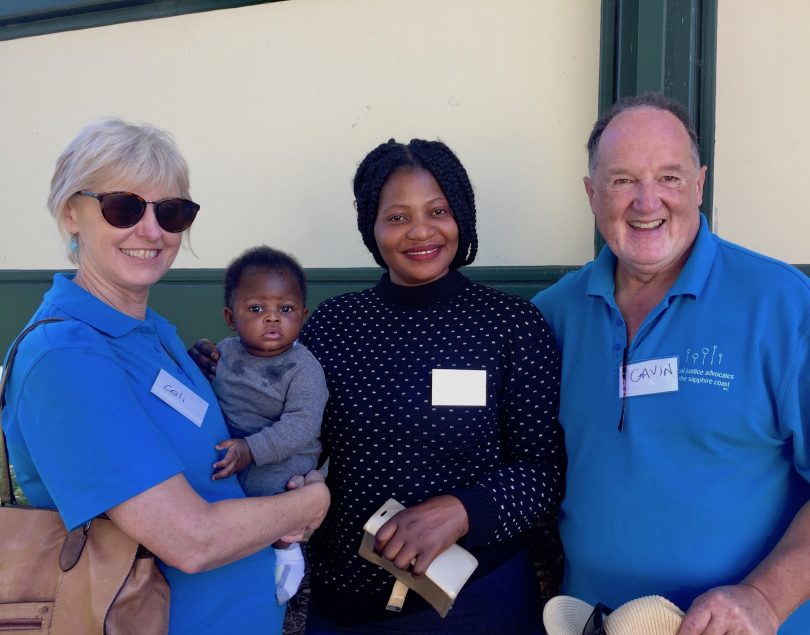
Gavin Bell and Celi Kennedy with Guinean Aicha and her baby Souleymane. Photo Lisa Herbert
My heart sank as I scrolled through the comments on a Facebook post recently about the ‘welcome refugees’ signs in the Bega Valley.
I moved here permanently two years ago, having visited the area for over four decades, and always felt the people of the Bega Valley were welcoming and caring. Well, I’ve felt welcome anyway.
But the strength of the hatred in some of the Facebook comments truly surprised me.
I had an overwhelming sense that I should ‘put my money where my mouth is’ and actually seek out some refugees and find out if they were the extremist, fanatical scoundrels that many seemed to believe.
Fortuitously an email from Gavin Bell and the Social Justice Advocates of the Sapphire Coast came across my desk that day. There were several families, refugees and recent migrants, currently living in Canberra, coming to the Sapphire Coast for a holiday – 41 people in all. The community was being invited to help out, or just come along and meet them, so I took up the invite.
My first stop was Tanja Public School last Friday where half of the visitors were meeting school kids and teachers. Preparations were underway for the Tanja School Market the next day so there were lots of parents and friends helping with decorations and signage.
The acting principal, Danielle McGrath welcomed everyone and paired up her students with the younger visitors. The students embraced the job, enthusiastically showing off their lovely school, then heading to the sports-ground for ballgames.
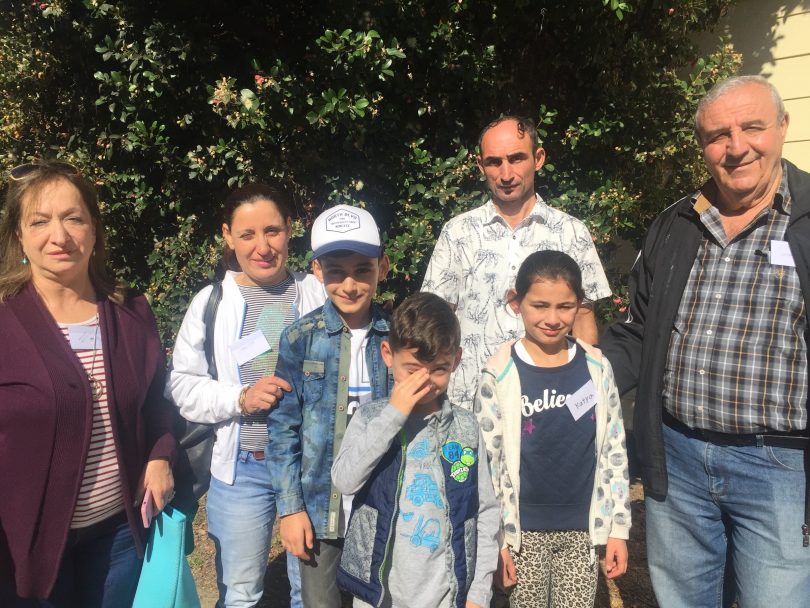
Iraqis Sulaiman and Noha with Gayath, Najiya, Dany, Katya and Eli, soaking up the sunshine. Photo Lisa Herbert
And then, I met my very first actual refugees, softly spoken Khair Haida and his son. His wife Shafiqa kept her distance, and kept her eyes averted from mine, and did not smile. She held their daughter, the very cheeky Fatima. I found myself adjusting my outgoing nature, reigning myself in a little. Some of these people were obviously unsure, a little wary of boisterous Australians.
But then Noha rushed to introduce herself to me, and me to her husband Sulaiman, who I had thought was one of the Australian teachers, he looked so Aussie. Sulaiman and Noha’s family are Iraqi Christians from Mosel. So here was another surprise. These people are not necessarily Muslim.
Sulaiman’s family was one of the thousands of Christians that fled their homes in Mosel, the second largest city in Iraq, to escape ISIS in 2014. They ended up in a camp in Jordan for two years, where one of his sons still lives.
“ISIS kills the Christians” says Sulaiman, “when I think of it I am very sad for my city.”
Sulaiman’s gorgeous bubbly wife Noha wants me to be very sure “we are three years in Australia, anniversary next weekend! Canberra is lovely, clean, beautiful people are very nice to my family.”
I’m then drawn to a beautiful family group and I meet Aicha and her children, from Guinea. Aicha doesn’t have much English, and though the kids do (they have been here for two years), they are extremely shy. Another learning curve, I don’t even know where Guinea is.
Later I do some research, and I’m surprised again. The refugees from countries such as Guinea are not necessarily escaping groups like ISIS or religious or political persecution, but extreme poverty and the looming danger of the worst forms of global child labour and exploitation. These things are truly foreign to me, unheard of in my Australian life.
Guinea is a West African country. The nation has a long history of helping others escape persecution. It has taken in thousands of refugees from Sierra Leone. However, Guinea refugees are both incoming and outgoing, the nation takes in thousands, but thousands are also leaving.
Some Guinean boys are subjected to forced labour in gold and diamond mining, while girls are exploited for domestic work and sexual acts.
I look into the eyes of these teenage kids and wonder what they’ve seen.
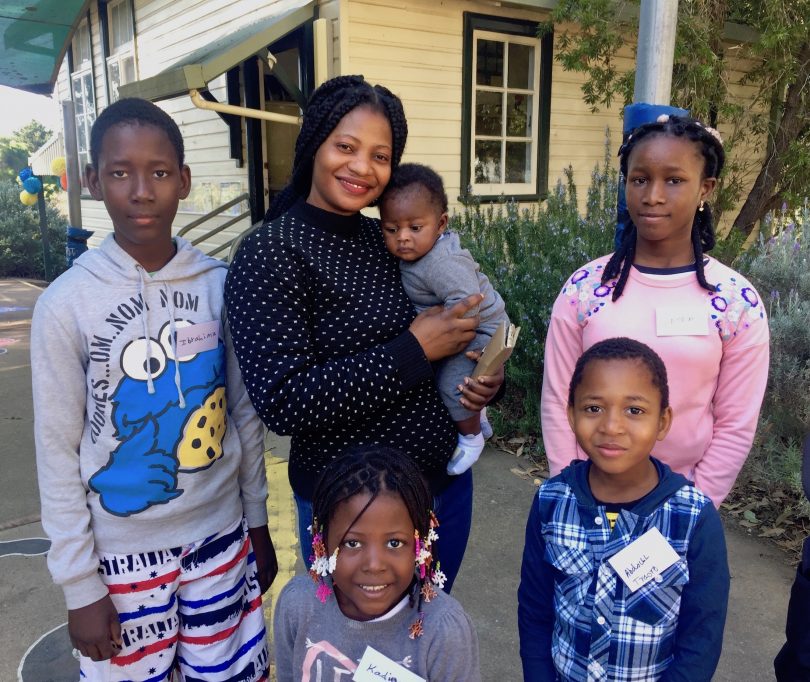
A day at Tanja: Aicha, from Guinea, with her family Ibrahima, Abdoul, Salematon, Kadia and baby Souleymane. Photo Lisa Herbert
I begin talking to Kathy, who is hosting Khair and his family. So comes another surprise. Kathy and her husband Rick MacFetters are my neighbours.
Quietly, without fuss or brouhaha, they are opening their home and giving their time, for four days, just up the road from me. I ask them if I could visit after the weekend. Of course they say yes.
Then I seek out a striking looking couple I saw earlier. Turns out the pair are Naresh Ginasekere, the Manager of MARSS, the Migrant and Refugee Settlement Service and his wife Chamari.
Originally from Sri Lanka, Naresh came here in 2014, and is now “giving back, as the support I received was very helpful.”
They provide assistance with English, employment, driving, after-school tutoring, and more. MARSS looks after over 300 people, helping families to settle into life in Australia, specifically in Canberra.
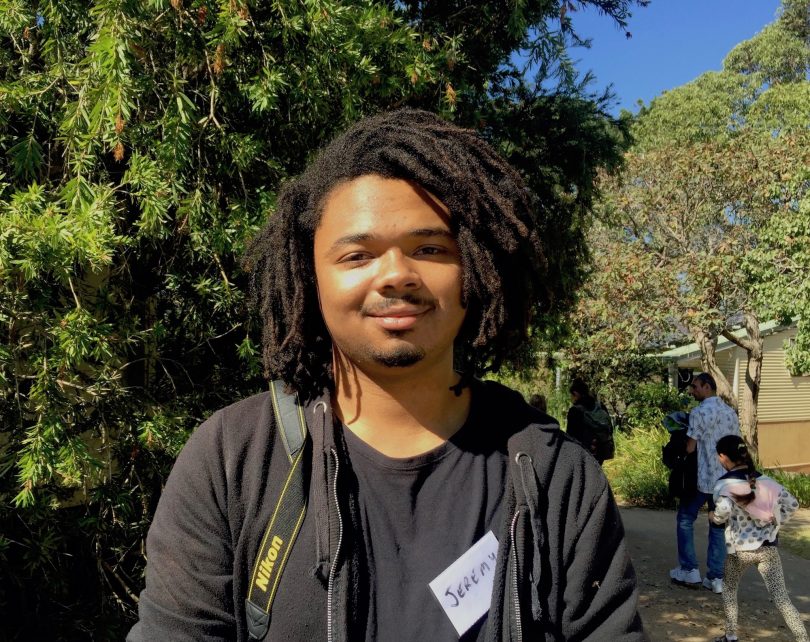
Jeremy Abdul-Karim’s grandfather came to Australia from Ghana via Canada. Photo Lisa Herbert
My next introduction is the handsome and intelligent Jeremy Abdul-Karim who was born in Australia. He has studied psychology at uni and works with MARSS.
Through reaching out to the Ghanian community in Canberra he says he “realised I’ve lost some of my own culture. Volunteering and helping out means I’m actually making connections with my own culture.” The guest children adore him, constantly dragging him off to play basketball.
A day at Pambula Beach with local lifesavers and the Aboriginal community followed, before the region’s quests headed up and over Brown Mountain for home on Sunday.
I went next door to catch up with Rick and Kathy MacFetters the day after their visitors left.
“We found it an amazing experience, such a simple thing, to open your home,” Rick says.
“The pleasure and appreciation was incredible, and we found ourselves often explaining – you don’t have to say thank you so much, we enjoy having you here.”
This is the second time Rick and Kathy have been a host family.
“Last year the Sudanese grandfather did talk about some of the things that had happened to them. Some of the horror. It was confronting, very hard to relate to.”
“This year, with our family, they didn’t talk about their experiences at all.”
Rick and Kathy think that given more time walls would have been broken down, but “we stayed on the positive, the beauty of Afghanistan,” Kathy says.
“We would like to stay in touch with them.”
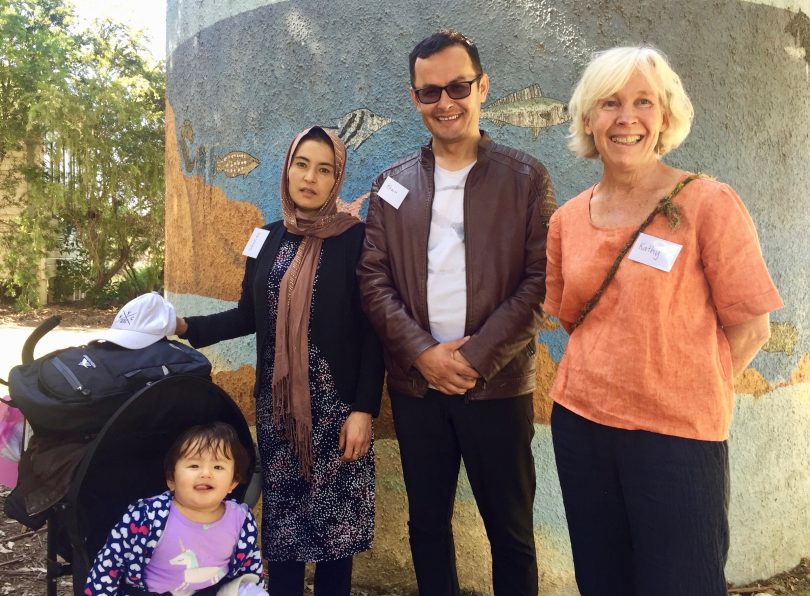
Host Kathy MacFetters with Shafiqa, Khair and daughter Fatima, from Afghanistan. Photo Lisa Herbert
As the retired principal of Tanja Public School, I asked Rick why he thought the interaction with children was important – “All they hear is the negative in the Bega Valley. The more our kids can see them as ‘just other kids’ the better the understanding. Some of the families may be Muslim, some Christian, and sometimes is takes our children to show the parents.”
For my part, having been drawn to the experience by the fear and hatred I witnessed on social media, I’d like to say I have learned a little more.
It’s an experience that built greater understanding, and appreciation in me and one that I wish more people were open to, because I am not sure you can be filled with hatred and fear after an experience like the one afforded to me and the region by the Social Justice Advocates.







